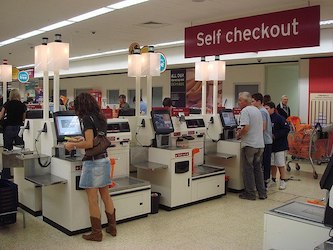Booths, a supermarket chain in northern England, has decided to remove self-service tills from almost all of its stores in response to customer feedback. The company believes that having staffed checkouts will provide a better customer experience. This decision makes Booths the first UK supermarket to move away from using self-service tills, which have become increasingly common in recent years.
The managing director of Booths, Nigel Murray, explained that customers have expressed dissatisfaction with the self-scan machines, citing issues with speed, reliability, and impersonal interactions. Additionally, the need for visual verification of loose items and age checks for alcohol purchases has caused inconvenience for customers. The company aims to prioritize warm, personal care by having human beings serve customers instead of relying on artificial intelligence.
Booths, often referred to as a northern Waitrose, has a long-standing philosophy of providing the best goods in attractive stores staffed with first-class assistants. The company prides itself on delivering a warm northern welcome and is committed to investing in its people to maintain high standards of service. While self-checkouts will be retained in two stores in the Lake District to accommodate busy periods, the majority of stores will transition to staffed checkouts.
The origin of self-service checkouts can be traced back to the 1990s, and their numbers have continued to grow over the years. Despite their popularity, some shoppers remain unconvinced about the benefits of self-service tills, with concerns about the lack of human interaction. However, others appreciate the convenience and efficiency of self-service checkouts. Booths’ decision has received mixed reactions from customers, with some expressing disappointment at the removal of self-service tills, while others welcome the return of human interaction during their shopping experience.
Original news source: Self-service: Booths supermarket puts staff back behind its tills (BBC)
Listen
Slow
Normal
Fast
Group or Classroom Activities
Warm-up Activities:
– Opinion Poll
Instructions: Students are to be divided into small groups. Each group conducts an opinion poll among their peers about their preferences between self-service and staffed checkouts. They must prepare at least five questions related to customer service experiences and then present their findings to the class, focusing on the language used to express preferences and opinions.
– News Reporter Role-play
Instructions: Students pair up and take on the roles of a news reporter and the managing director of Booths, Nigel Murray. The reporter interviews the director about the decision to remove self-service tills. Students should focus on using reported speech to relay their partner’s answers to the class afterward.
– Vocabulary Pictionary
Instructions: Write down key vocabulary from the article (e.g., self-service tills, customer feedback, reliability, impersonal interactions, visual verification) on separate pieces of paper. Students take turns drawing the words for their team to guess, without speaking or writing letters or numbers. This activity focuses on the students’ ability to express and guess vocabulary through drawings.
– Future Predictions
Instructions: In groups, students discuss and make predictions about the future of supermarkets and shopping experiences, based on the article about Booths. They must use future tense structures to present their ideas to the class and provide reasons for their predictions.
– Headline Creation
Instructions: Students work in small groups to create a catchy newspaper headline that summarizes the article’s main point. They must consider the impact of word choice and connotation to grab the reader’s attention. Afterward, each group presents their headline, and the class discusses which one is most effective and why.
Comprehension Questions:
1. What decision has Booths, a supermarket chain in northern England, recently made regarding self-service tills?
2. What are the reasons cited by Nigel Murray for Booths’ decision to remove self-service checkouts?
3. How does Booths aim to differentiate its customer experience by removing self-service tills?
4. What is Booths’ philosophy and commitment towards customer service?
5. How will Booths’ stores in the Lake District differ from the majority of its stores in terms of checkout options?
6. When did self-service checkouts first appear in supermarkets?
7. What are some of the concerns that shoppers have about self-service tills?
8. How have customers reacted to Booths’ decision to remove self-service checkouts?
Go to answers ⇩
Listen and Fill in the Gaps:
Booths, a supermarket (1)______ in northern England, has decided to remove self-service tills from almost all of its stores in response to (2)______ feedback. The company believes that having staffed checkouts will provide a better customer experience. This decision makes Booths the first UK supermarket to move away from using self-service tills, which have become increasingly common in recent years.
The (3)______ director of Booths, Nigel (4)______, explained that customers have expressed dissatisfaction with the self-scan machines, citing (5)______ with speed, (6)______, and impersonal interactions. Additionally, the need for visual verification of loose items and age (7)______ for alcohol purchases has caused inconvenience for (8)______. The company aims to prioritize warm, personal care by having human beings serve customers instead of relying on artificial intelligence.
Booths, often referred to as a northern Waitrose, has a long-standing philosophy of providing the best goods in attractive stores staffed with first-class assistants. The company (9)______ itself on delivering a warm (10)______ welcome and is committed to investing in its people to maintain high standards of service. While self-checkouts will be retained in two stores in the Lake (11)______ to accommodate busy periods, the majority of stores will transition to staffed checkouts.
The (12)______ of self-service checkouts can be traced back to the 1990s, and their numbers have continued to grow over the years. Despite their popularity, some shoppers remain unconvinced about the benefits of self-service tills, with concerns about the lack of human interaction. However, others appreciate the convenience and (13)______ of self-service checkouts. Booths’ decision has received (14)______ reactions from customers, with some expressing disappointment at the removal of self-service tills, while others welcome the (15)______ of human interaction during their (16)______ experience.
Go to answers ⇩
Discussion Questions:
Students can ask a partner these questions, or discuss them as a group.
1. What is your personal preference when it comes to checkouts at a supermarket, self-service or staffed tills, and why?
2. How would you feel if your local supermarket removed self-service checkouts in favor of staffed ones?
3. Do you think the presence of staffed checkouts impacts the overall shopping experience? Why or why not?
4. Have you ever had a frustrating experience with a self-service till? Can you describe what happened?
5. What is one aspect of human interaction at a checkout that you believe cannot be replicated by a machine?
6. Do you like the idea of supermarkets prioritizing personal care over technological convenience? Why or why not?
7. How do you think the removal of self-service tills might affect the employment landscape in the retail sector?
8. Do you think artificial intelligence can fully replace human beings in customer service roles? Why or why not?
9. What is your opinion on the balance between technology and human employment in the retail industry?
10. Have you ever chosen a store specifically because of the type of checkout options they offer? What influenced your decision?
11. How would you feel if a store you frequently shop at made a significant change like Booths did, based on customer feedback?
12. Do you think other supermarkets should follow Booths’ example and remove self-service tills? Why or why not?
13. What is the importance of a “warm northern welcome” or similar cultural touches in a shopping experience for you?
14. In your experience, do self-service checkouts generally speed up or slow down your shopping process?
15. Do you think there are any particular types of stores where self-service checkouts are more appropriate than in others? Why or why not?
Individual Activities
Vocabulary Meanings:
Match each word to its meaning.
Words:
1. Booths
2. self-service
3. supermarket
4. customer
5. staffed
6. northern
7. artificial
8. interaction
Meanings:
(a) Not operated by machines
(b) A machine that allows customers to scan and pay for items themselves
(c) Communication or involvement between people
(d) A company that has decided to remove self-service tills
(e) Not real or natural
(f) The region of England where Booths is located
(g) A place where goods are sold
(h) A person who buys goods or services
Go to answers ⇩
Multiple Choice Questions:
1. What is the reason Booths decided to remove self-service tills from almost all of its stores?
(a) Cost-cutting measures
(b) Customer feedback
(c) Lack of space in the stores
(d) Government regulations
2. According to the article, what was one of the main reasons for customer dissatisfaction with self-scan machines?
(a) Lack of available machines
(b) High cost of using the machines
(c) Issues with speed and reliability
(d) Long queues at the self-service tills
3. What does Booths aim to prioritize by having human beings serve customers instead of relying on artificial intelligence?
(a) Fast service
(b) Warm, personal care
(c) Lower prices
(d) Technological innovation
4. What is Booths often referred to as?
(a) A northern Waitrose
(b) A southern Tesco
(c) A western Sainsbury’s
(d) An eastern Asda
5. What is one of the reasons why self-checkouts will be retained in two stores in the Lake District?
(a) To test new technology
(b) To reduce operating costs
(c) To accommodate busy periods
(d) To attract younger customers
6. When did the origin of self-service checkouts begin?
(a) 1990s
(b) 2000s
(c) 1980s
(d) 1970s
7. What has been a concern for some shoppers regarding self-service tills?
(a) High cost of using the machines
(b) Slow service
(c) Limited availability of machines
(d) Lack of human interaction
8. How have customers reacted to Booths’ decision to remove self-service tills?
(a) Overwhelmingly positive
(b) Overwhelmingly negative
(c) Indifferent
(d) Mixed reactions
Go to answers ⇩
True or False Questions:
1. The company aims to prioritize cold, impersonal care by having artificial intelligence serve customers instead of relying on human beings.
2. Booths has a long-standing philosophy of providing the best goods in attractive stores staffed with first-class assistants.
3. The company believes that having self-service checkouts will provide a better customer experience.
4. The managing director of Booths, Nigel Murray, explained that customers have expressed satisfaction with the self-scan machines, citing no issues with speed, reliability, and impersonal interactions.
5. While self-checkouts will be retained in two stores in the Lake District to accommodate busy periods, the majority of stores will transition to staffed checkouts.
6. Booths, a supermarket chain in northern England, has decided to remove self-service tills from almost all of its stores in response to customer feedback.
7. This decision makes Booths the last UK supermarket to move away from using self-service tills.
8. Booths’ decision has received mixed reactions from customers, with some expressing disappointment at the removal of self-service tills, while others welcome the return of human interaction during their shopping experience.
Go to answers ⇩
Write a Summary:
Write a summary of this news article in two sentences.
Check your writing now with the best free AI for English writing!
Writing Questions:
Answer the following questions. Write as much as you can for each answer.
Check your answers with our free English writing assistant!
1. What specific customer feedback led Booths to remove self-service tills from its stores?
2. How does Booths’ managing director, Nigel Murray, justify the decision to prioritize staffed checkouts over self-service tills?
3. In what way does Booths plan to maintain a high standard of service after removing self-service tills?
4. Why will Booths retain self-checkouts in two stores in the Lake District despite the general removal of these tills?
5. What are the differing opinions among customers regarding Booths’ decision to remove self-service tills?
Answers
Comprehension Question Answers:
1. What decision has Booths, a supermarket chain in northern England, recently made regarding self-service tills?
Booths has decided to remove self-service tills from almost all of its stores in response to customer feedback, opting for staffed checkouts to provide a better customer experience.
2. What are the reasons cited by Nigel Murray for Booths’ decision to remove self-service checkouts?
Nigel Murray mentioned customer dissatisfaction with self-scan machines due to issues with speed, reliability, and impersonal interactions. Inconveniences such as the need for visual verification of loose items and age checks for alcohol purchases were also factors.
3. How does Booths aim to differentiate its customer experience by removing self-service tills?
Booths aims to prioritize warm, personal care by having human beings serve customers instead of relying on artificial intelligence, to enhance the customer experience.
4. What is Booths’ philosophy and commitment towards customer service?
Booths’ philosophy is to provide the best goods in attractive stores staffed with first-class assistants, delivering a warm northern welcome and investing in its people to maintain high standards of service.
5. How will Booths’ stores in the Lake District differ from the majority of its stores in terms of checkout options?
Booths will retain self-checkouts in two stores in the Lake District to accommodate busy periods, while the majority of stores will transition to staffed checkouts.
6. When did self-service checkouts first appear in supermarkets?
Self-service checkouts first appeared in supermarkets in the 1990s.
7. What are some of the concerns that shoppers have about self-service tills?
Some concerns include the lack of human interaction, issues with the speed and reliability of the machines, and the inconvenience of needing assistance for certain items and age verification.
8. How have customers reacted to Booths’ decision to remove self-service checkouts?
Customers have had mixed reactions to Booths’ decision. Some are disappointed at the removal of self-service tills, while others welcome the return of human interaction during their shopping experience.
Go back to questions ⇧
Listen and Fill in the Gaps Answers:
(1) chain
(2) customer
(3) managing
(4) Murray
(5) issues
(6) reliability
(7) checks
(8) customers
(9) prides
(10) northern
(11) District
(12) origin
(13) efficiency
(14) mixed
(15) return
(16) shopping
Go back to questions ⇧
Vocabulary Meanings Answers:
1. Booths
Answer: (f) The region of England where Booths is located
2. self-service
Answer: (g) A place where goods are sold
3. supermarket
Answer: (h) A person who buys goods or services
4. customer
Answer: (a) Not operated by machines
5. staffed
Answer: (d) A company that has decided to remove self-service tills
6. northern
Answer: (e) Not real or natural
7. artificial
Answer: (b) A machine that allows customers to scan and pay for items themselves
8. interaction
Answer: (c) Communication or involvement between people
Go back to questions ⇧
Multiple Choice Answers:
1. What is the reason Booths decided to remove self-service tills from almost all of its stores?
Answer: (b) Customer feedback
2. According to the article, what was one of the main reasons for customer dissatisfaction with self-scan machines?
Answer: (c) Issues with speed and reliability
3. What does Booths aim to prioritize by having human beings serve customers instead of relying on artificial intelligence?
Answer: (b) Warm, personal care
4. What is Booths often referred to as?
Answer: (a) A northern Waitrose
5. What is one of the reasons why self-checkouts will be retained in two stores in the Lake District?
Answer: (c) To accommodate busy periods
6. When did the origin of self-service checkouts begin?
Answer: (a) 1990s
7. What has been a concern for some shoppers regarding self-service tills?
Answer: (d) Lack of human interaction
8. How have customers reacted to Booths’ decision to remove self-service tills?
Answer: (d) Mixed reactions
Go back to questions ⇧
True or False Answers:
1. The company aims to prioritize cold, impersonal care by having artificial intelligence serve customers instead of relying on human beings. (Answer: False)
2. Booths has a long-standing philosophy of providing the best goods in attractive stores staffed with first-class assistants. (Answer: True)
3. The company believes that having self-service checkouts will provide a better customer experience. (Answer: False)
4. The managing director of Booths, Nigel Murray, explained that customers have expressed satisfaction with the self-scan machines, citing no issues with speed, reliability, and impersonal interactions. (Answer: False)
5. While self-checkouts will be retained in two stores in the Lake District to accommodate busy periods, the majority of stores will transition to staffed checkouts. (Answer: True)
6. Booths, a supermarket chain in northern England, has decided to remove self-service tills from almost all of its stores in response to customer feedback. (Answer: True)
7. This decision makes Booths the last UK supermarket to move away from using self-service tills. (Answer: False)
8. Booths’ decision has received mixed reactions from customers, with some expressing disappointment at the removal of self-service tills, while others welcome the return of human interaction during their shopping experience. (Answer: True)
Go back to questions ⇧















